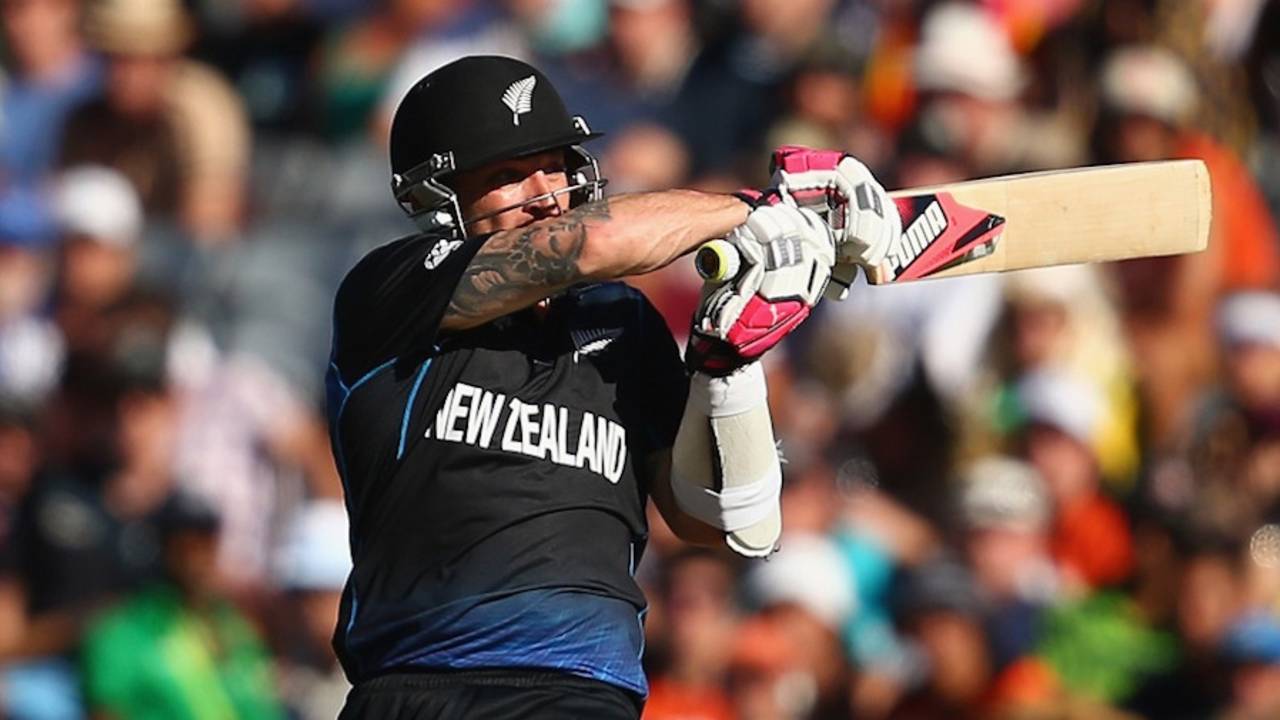The uneven schedule of the World Cup is far from ideal, with gaps of longer than a week between some team's matches, but on balance it's probably a good job New Zealand have some time off before their next outing against Afghanistan. After Saturday at Eden Park everyone needs a moment to catch their breath and, in
Brendon McCullum's case, shake off the bruises.
As the emotion subsides from that incredible day - courtesy of Trent Boult and Mitchell Starc a much shorter day than it might have been - it will also be worthwhile for some calm assessment of the "learnings", as Mike Hesson termed them, which can be taken from New Zealand's heart-stopping run chase.
It's plainly clear that their bowling is in fine fettle and it may seem churlish to try to find weakness in a campaign that is now four wins from four, swept along on a wave of emotion that hit new levels on Saturday. But it is often wise to be critical from a position of strength.
Before the match against Australia (and, for that matter, England although that is now appearing a gross over estimation) it was billed as the true test of where this New Zealand side had progressed to, especially with their batting line-up. The England game proved little - except how far McCullum could hit a ball - and for a period the Australia contest appeared to be heading in the same direction.
But then the collapse set in. Firstly a wobble as McCullum,
Ross Taylor and Grant Elliott fell in the space of one run before the more eye-popping demise from 131 for 4 that almost cost them the game.
Before going further it should be restated how outstanding Starc's spell was - one of the great white-ball bursts, as was Boult's a few hours earlier. Still, some techniques were also left wanting, as Michael Clarke made plainly obvious with his comments about Australia's performance. Hesson was a little subtler about the challenges of facing swing. "It's something we're going to have to be a little bit better prepared for next time," he said.
Adam Milne and Tim Southee can be excused for their swift departures to Starc, but Elliott was not in the same postcode when he faced the first ball after the interval, while Taylor did not give himself the best chance by playing across the line. The zing bails never threatened to stay in their grooves and will have needed recharging.
After the frenetic pace of the outings since then, a performance closer to their first outing in one of their two remaining matches would serve New Zealand well.
Taylor's form is shaping as the key concern for New Zealand. His World Cup hasn't started yet. A scratchy innings against Sri Lanka, a slog against Scotland, a brief not out against England and then 1 off two deliveries against Australia.
He entered the tournament with some strong numbers under his belt - 96 against Sri Lanka then unbeaten scores of 59 and 102 against Pakistan - so it is far from a crisis, especially for a player who averages 41.18 in ODIs, but the way New Zealand structure their innings, with early aggression the order of the day, makes the role of Nos. 3 and 4 even more vital.
Kane Williamson is ticking along beautifully, but he can't be expected to shoulder all the burden of travelling in the slipstream of McCullum. Martin Guptill's frustrating knack of progressing smoothly but not converting means, as against Australia, a blistering start can soon become something less secure.
There remains a school of thought that McCullum should rein himself in rather than blazing on regardless but New Zealand have built their team to allow him that freedom.
His numbers in 2015 - an average of 40.58 and a strike-rate of 142.39 - shows he is marrying two elements and in the last three World Cup matches the success of his attack has allowed him a free approach. They are also a vast improvement
on 2014 when he averaged 20.33. But that does not mean that the prospect of him at the crease for closer to 30 overs rather than 10 is not a tantalising one (unless you are a bowler).
The structure of New Zealand's fixtures could help them, even if the lengthy gaps provide a little too much downtime. They now have matches against Afghanistan and Bangladesh, both capable of making life tricky for batsmen but also offering the chance - on two traditionally flat surfaces in Napier and Hamilton - to build substantial innings ahead of the quarter-final, perhaps against South Africa, in Wellington.
The form of the bowling attack will make it very tempting for McCullum to stick the opposition in and aim for further quick victories but there is also value in considering allowing his batsmen to set a target - providing them the chance to bat 50 overs and reacquainting them with the skills of having to deduce a target to set rather than hunt one down with insatiable haste.
Of course, that decision could be made for McCullum, as it was in the opening match of the tournament when Sri Lanka inserted them at Hagley Oval. New Zealand proceeded to forge a near-complete batting performance, putting 331 for 6 on the board, with three individual half-centuries and everyone who batted reaching double figures.
McCullum attacked, but in a relatively restrained fashion compared to his rampages against England and Australia, Williamson was the fulcrum, Corey Anderson provided the steadying hand before a strong finish with Elliott and Luke Ronchi chipping in. After the frenetic pace of the outings since then, a performance closer to their first outing in one of their two remaining matches would serve New Zealand well.
Andrew McGlashan is a senior assistant editor at ESPNcricinfo
